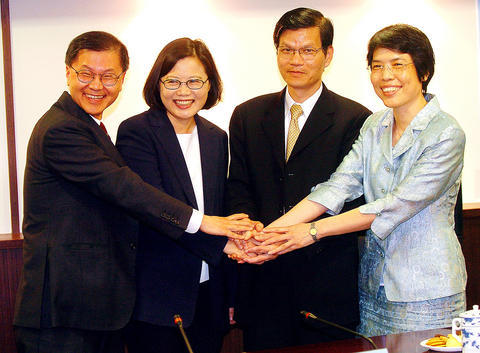The government is making a new push into the biotechnology sector by investing in a company that will focus on the development of a drug for treating AIDS.
The state-owned National Development Fund (NDF) will pump in US$20 million to help establish a biotech firm to be called TaiMed Biologics, Council for Economic Planning and Development Chairwoman Ho Mei-yueh (何美玥) told a press conference yesterday.
The move is one of a package of government measures designed to turn the nation's biotech industry into a trillion-dollar sector, following in the footsteps of the foundry and display industries.

PHOTO: CHEN TSE-MING, TAIPEI TIMES
Of the NT$30 billion (US$907 million) budget the government plans to invest in the biotech sector, the state fund has directly invested NT$8 billion in 12 biotech companies, Ho said, adding that the government could pump in more capital to fuel the industry's growth even after the budget is expended.
The new biotech company will be chaired by former vice premier Tsai Ying-wen (
David Ho told the press conference that, although it was impossible to know whether the NDF would see significant returns from its investment in TaiMed Biologics, this kind of investment is needed to stimulate the industry.
TaiMed Biologics purchased the patent for the drug TNX-355, which was developed by US-based Genentech Inc, and plans to complete development of the drug, which blocks HIV from entering human cells, in three years.
After launching TNX-355 on the global market, TaiMed Biologics will devote itself to developing flu and bird flu vaccines, he said.
If TaiMed Biologics later establishes a plant to manufacture drugs or other medical products, the NDF would also finance that, Ho Mei-yueh said.
Inviting private enterprises to jointly invest in TaiMed Biologics, the CEPD chairwoman said she had a shortlist of possible investors and would first approach Terry Gou (郭台銘), chairman of Hon Hai Precision Industry Co (鴻海精密).
On Sept. 4, Gou announced he would donate NT$15 billion to National Taiwan University to fund biomedical engineering projects and the construction of a hospital for treating cancer.
In June, Gou, who leads the world's largest contract maker of electronic components, reportedly said he would donate NT$100 billion to fund cancer research by scientists in Taiwan and China.
"I will brief him [to try to win] his support for the company [TaiMed Biologics]," Ho Mei-yueh said.
To encourage development of the biotechnology and pharmaceutical industry, the legislature in June passed tthe Biotech and New Pharmaceutical Development Statute (
The new law stipulates that 35 percent of company investment in R&D and personnel training in the two sectors is tax-deductible for the next five years.
If a firm's expenditure on R&D and personnel exceeds its average spending in the previous two years, 50 percent of the extra amount is tax-deductible.
In addition, employees in the industries who receive stock options do not need to pay income tax on their shares.
Government researchers who get permission from the institute where they are employed can also cooperate with private companies to develop new drugs, while researchers can work as consultants at private companies.

US PROBE: The Information reported that the US Department of Commerce is investigating whether the firm made advanced chips for China’s Huawei Taiwan Semiconductor Manufacturing Co (TSMC, 台積電), the world’s largest contract maker of advanced chips, yesterday said it is a law-abiding company, and is committed to complying with all applicable laws and regulations including export controls. The Hsinchu-based chip giant issued the statement after US news Web site The Information ran a story saying that the US Department of Commerce has launched a probe into TSMC over whether it breached export rules by making smartphone or artificial intelligence (AI) chips for China’s Huawei Technologies Co (華為). “We maintain a robust and comprehensive export system for monitoring and ensuring compliance,” the statement said. “If we

DEMAND FOR AI CHIPS: Net income in the third quarter surged 31.2% quarter-on-quarter to NT$325.26 billion, the strongest quarterly return in the company’s history Taiwan Semiconductor Manufacturing Co (TSMC, 台積電), the world’s biggest contract chipmaker, yesterday raised its revenue forecast to annual growth of 30 percent this year, thanks to strong and sustainable demand for artificial intelligence (AI) processors for servers. It was the second upward adjustment from 25 percent year-on-year growth estimated three months ago, despite recent concerns about whether the AI boom could be another technology bubble. “The demand is real. It’s real. And I believe it is just the beginning of this demand. Alright, so one of my key customers said the demand right now is ‘insane,’” TSMC chairman and chief executive C.C.

Starbucks Corp might have the more recognizable name, but 7-Eleven’s City Cafe remains the king of Taiwan’s fresh coffee market, helped by the convenience store chain’s extensive market presence and product diversification. President Chain Store Corp (PCSC, 統一超商), which runs both the 7-Eleven and Starbucks store chains in Taiwan, established the City Cafe brand in 2004. The brand took off when actress Gwei Lun-mei (桂綸鎂) became its spokesperson in 2007. City Cafe’s sales exceeded NT$10 billion (US$311.69 million) for the first time in 2015, surpassing the revenue of Starbucks Taiwan, and rose to more than NT$17 billion last year, exceeding the NT$14.98

COUNTRY-BASED: Setting ceilings on sales of the technology would tighten limits that originally targeted China’s ambitions in artificial intelligence amid security risks US officials have discussed capping sales of advanced artificial intelligence (AI) chips from Nvidia Corp and other American companies on a country-specific basis, people familiar with the matter said, a move that would limit some nations’ AI capabilities. The new approach would set a ceiling on export licenses for some countries in the interest of national security, according to the people, who described the private discussions on condition of anonymity. Officials in the administration of US President Joe Biden focused on Persian Gulf countries that have a growing appetite for AI data centers and the deep pockets to fund them, the people